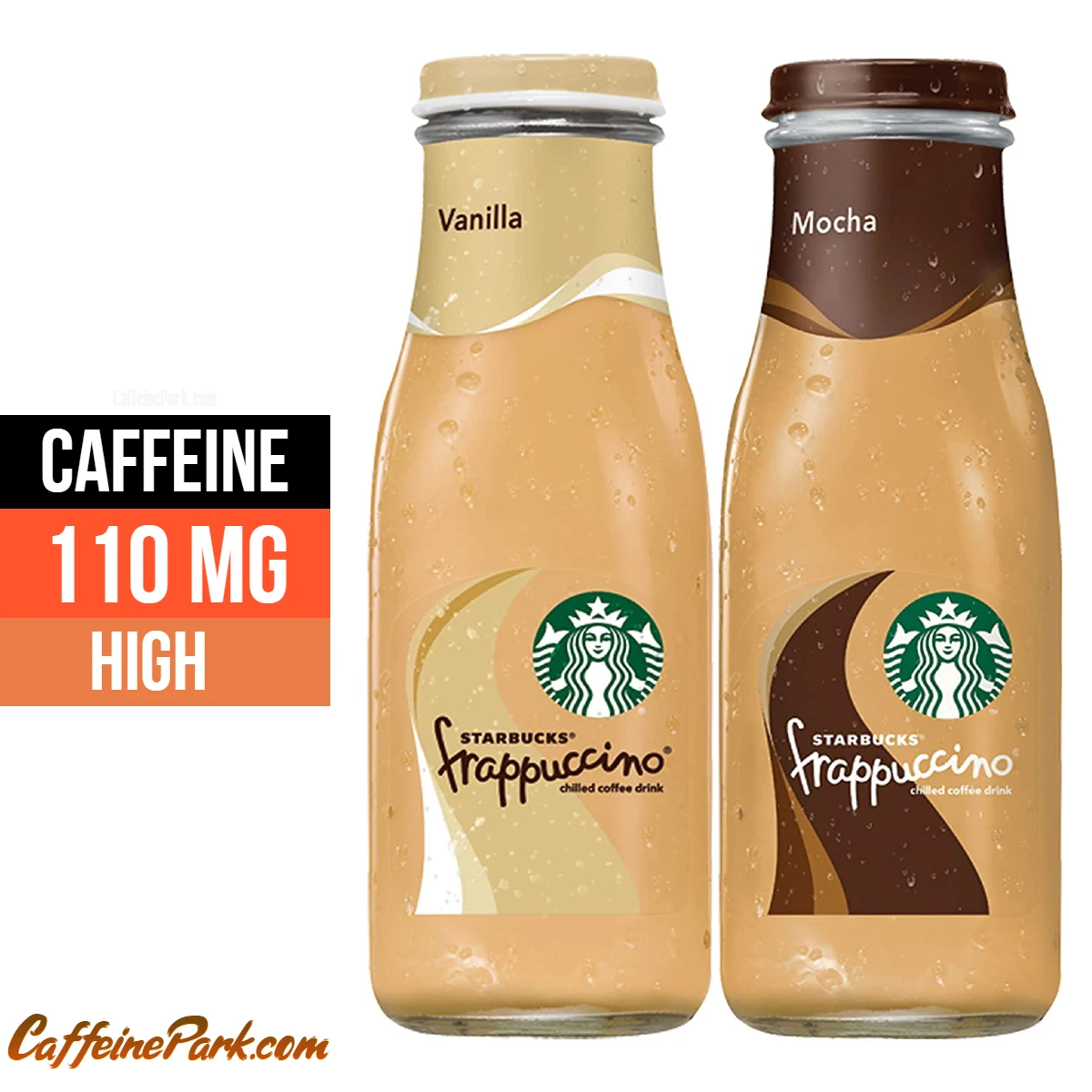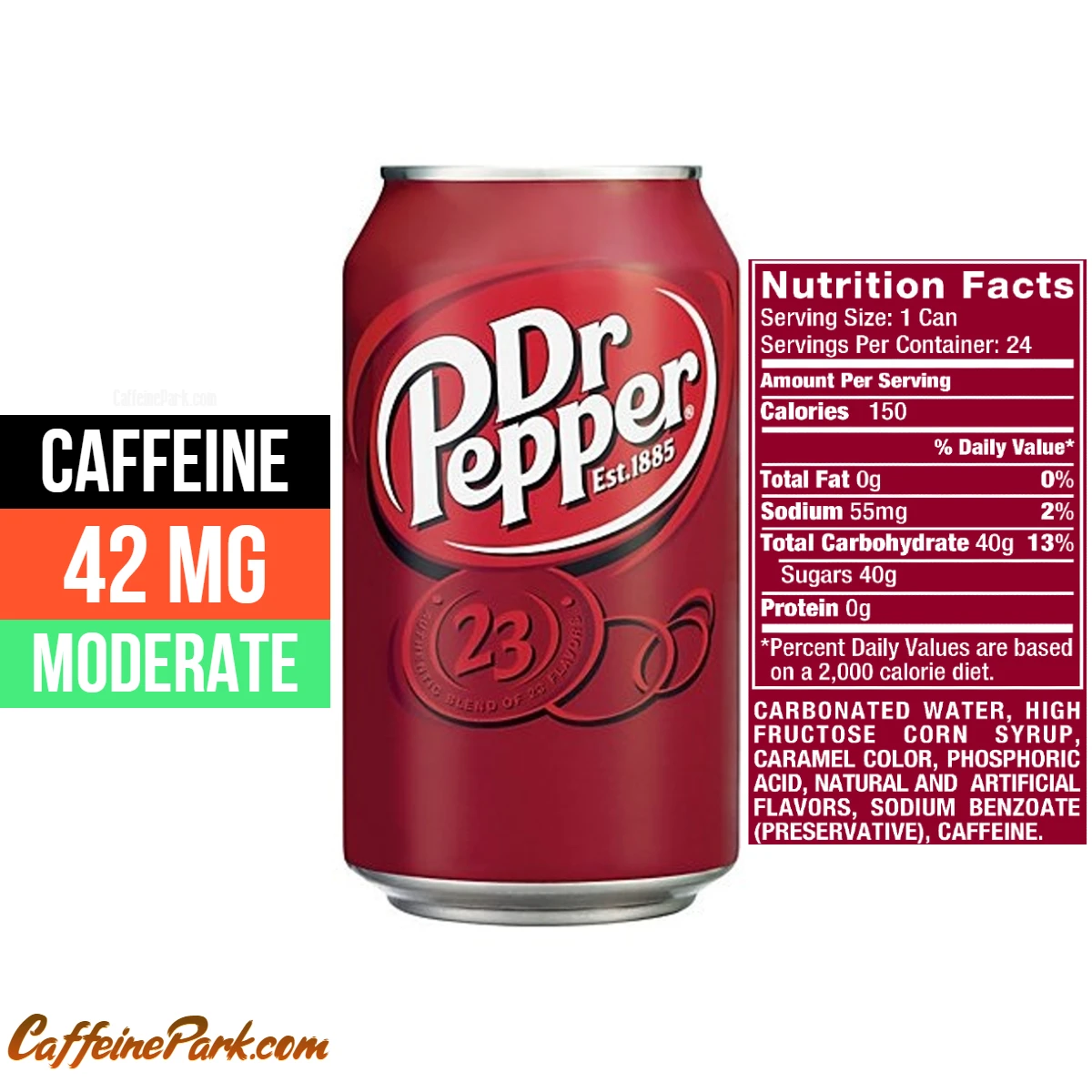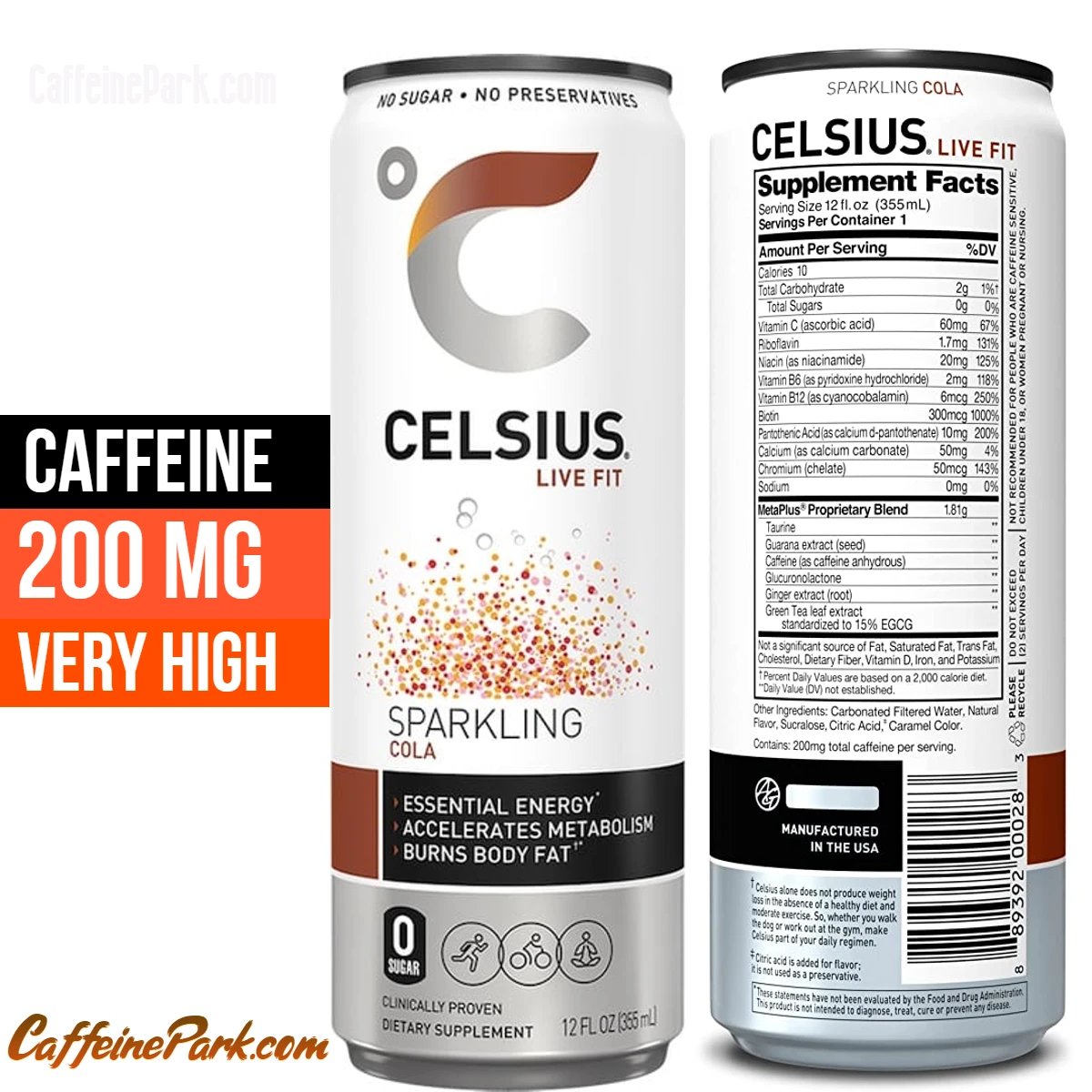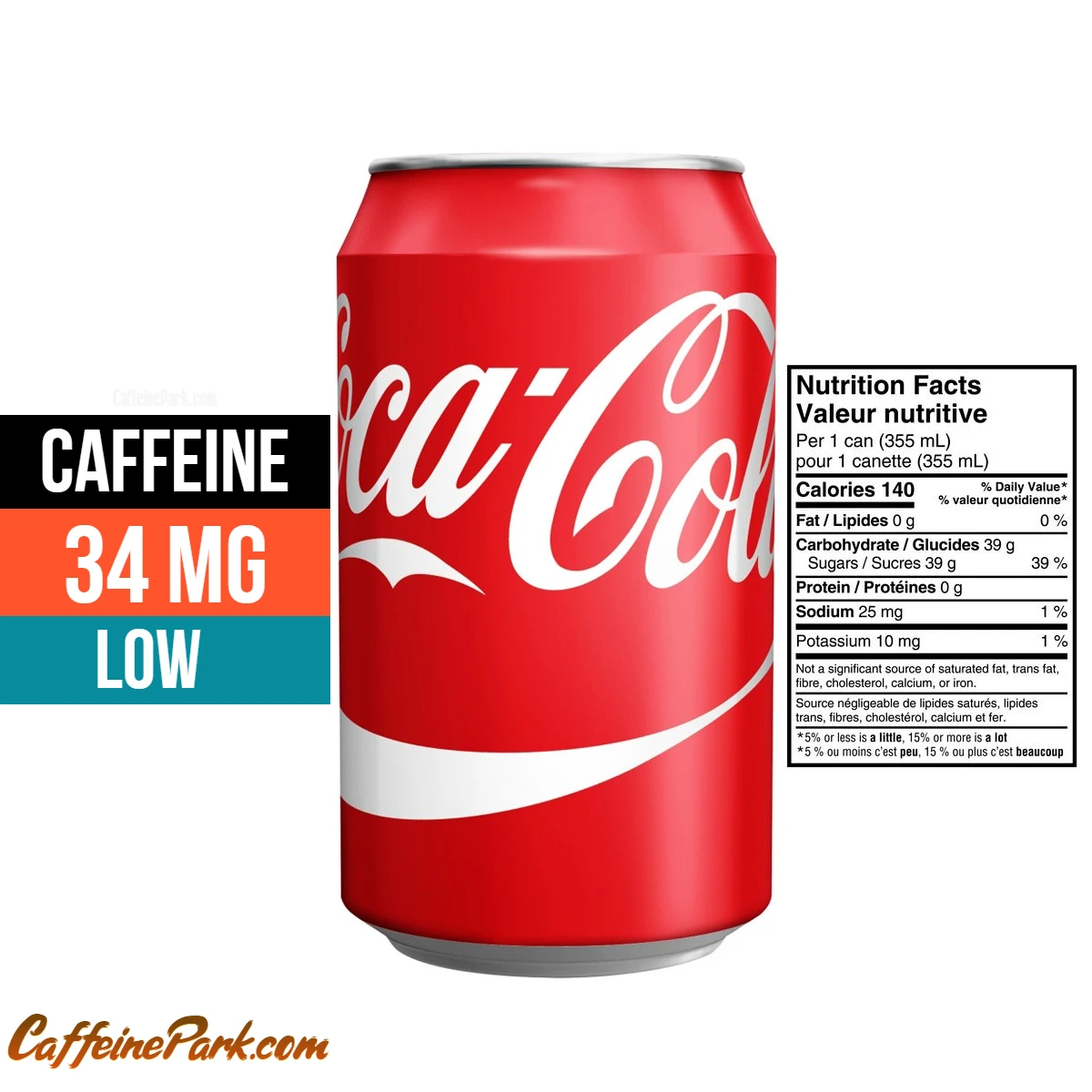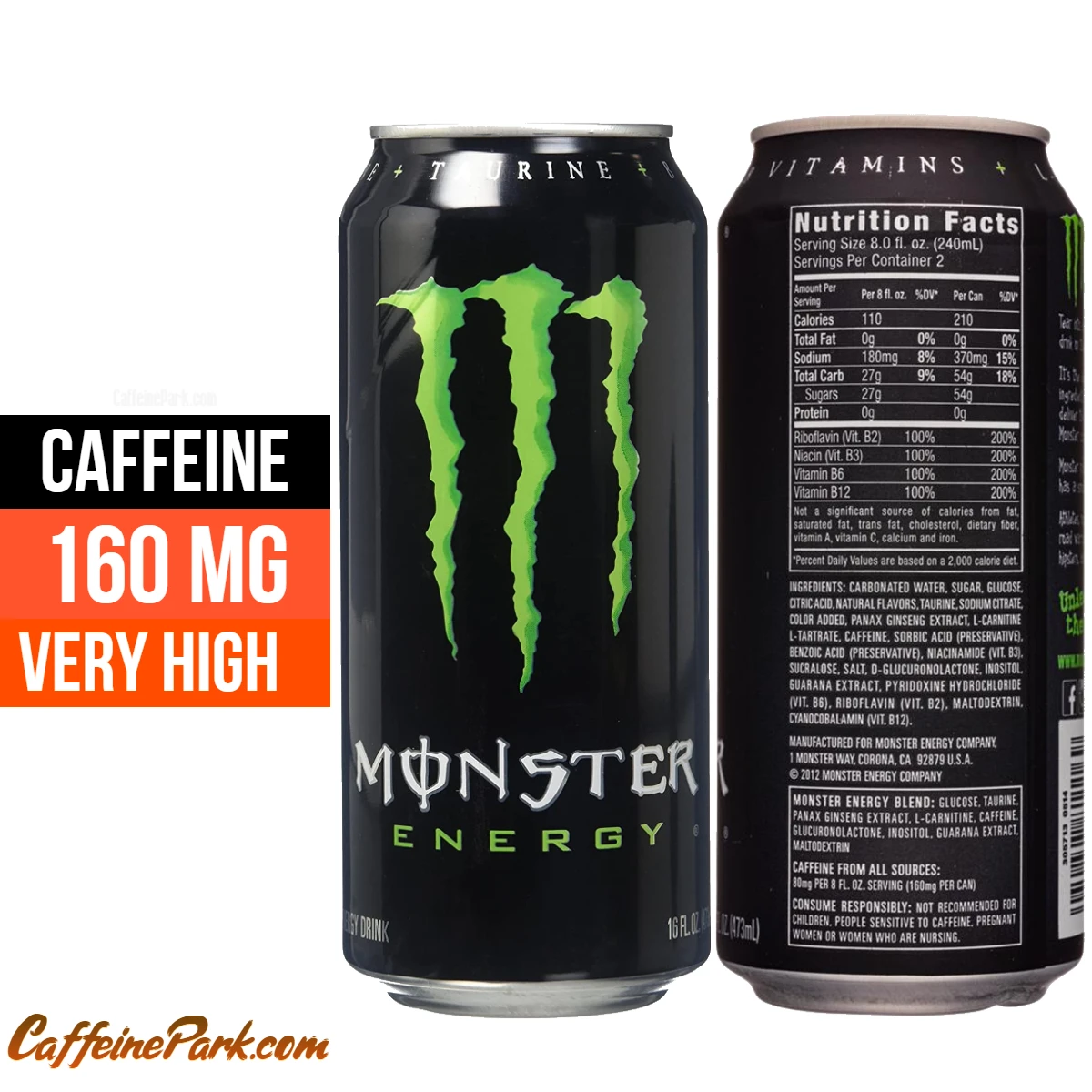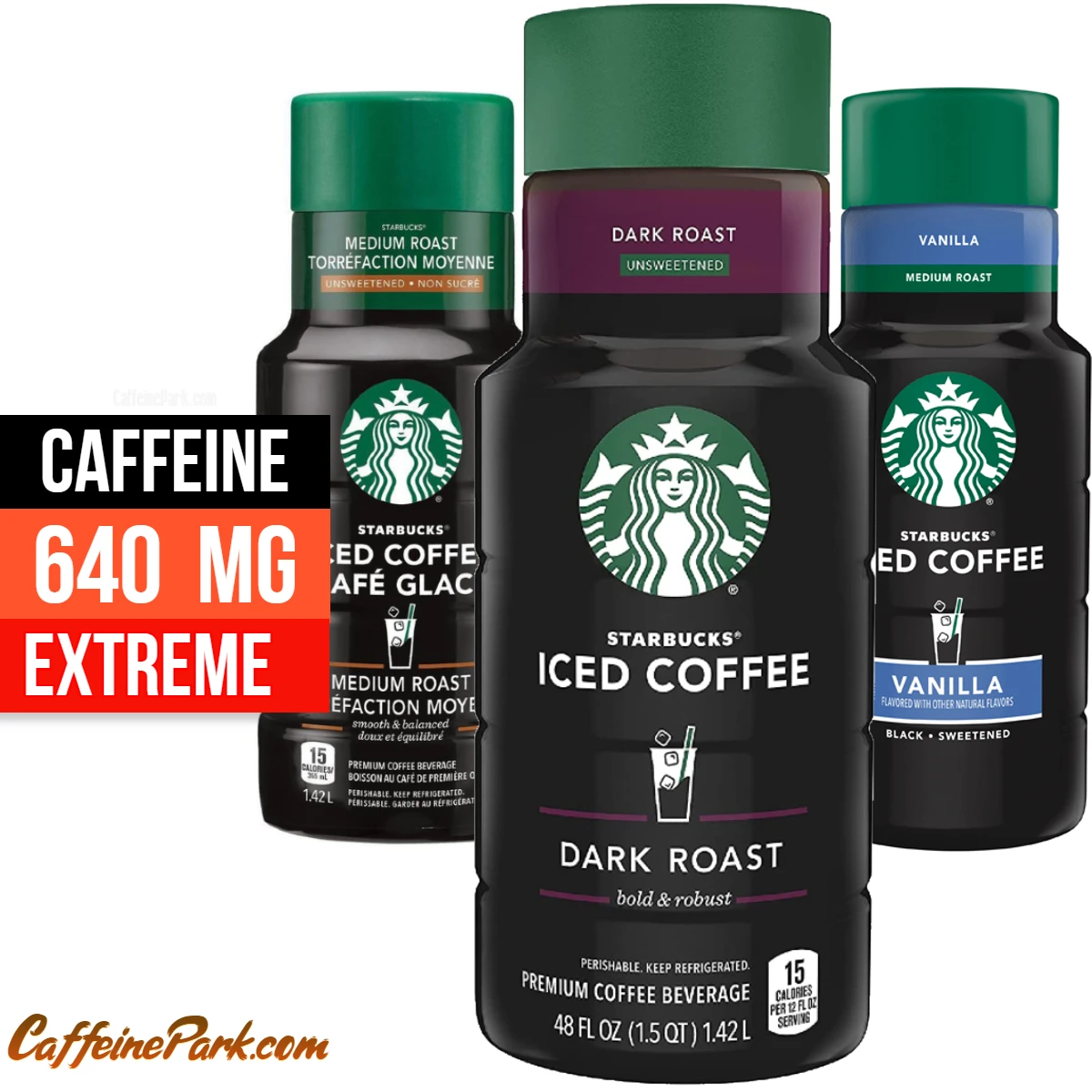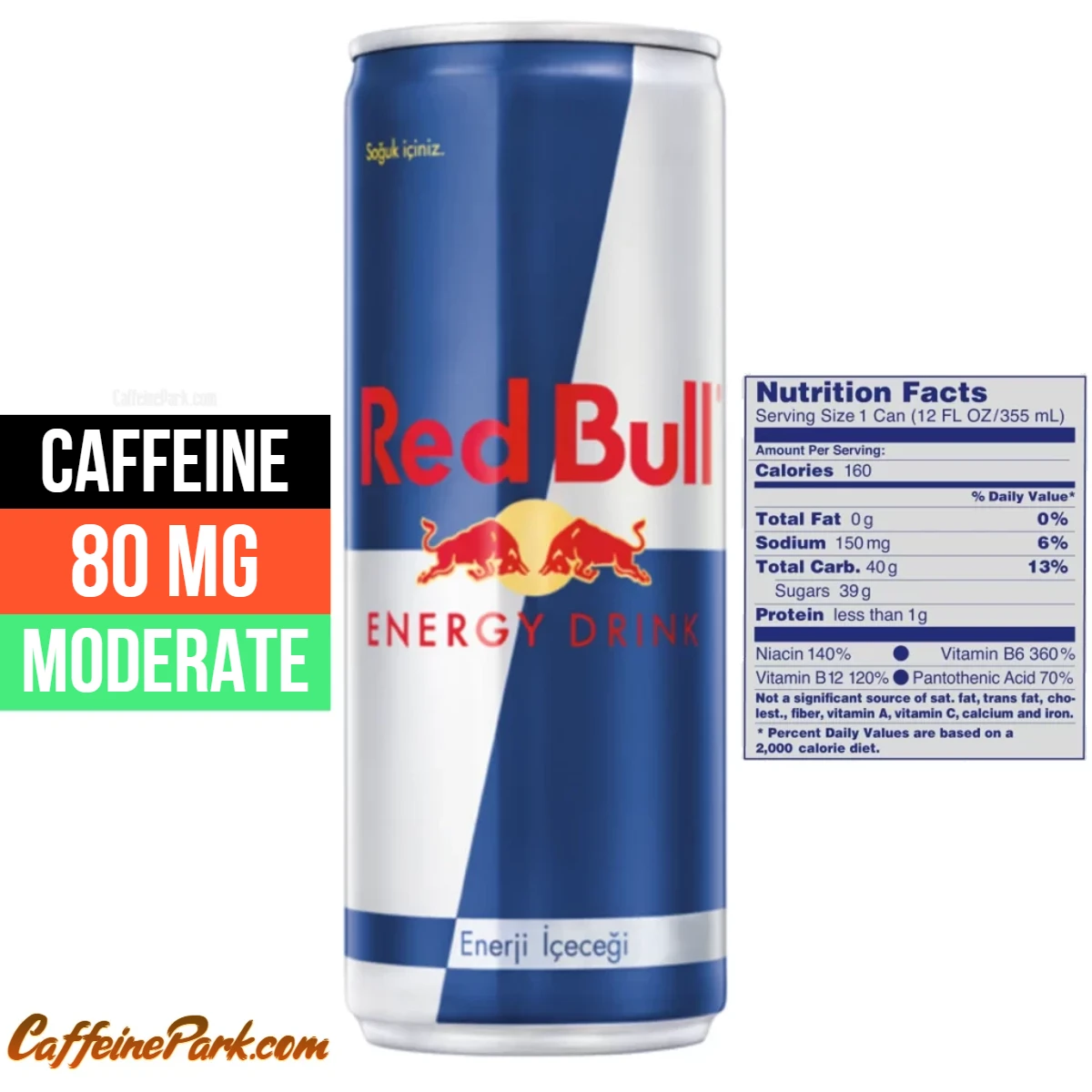
Red Bull, per 8.46 fluid ounce (fl oz) can contain approximately 80mg of caffeine. That’s quite a kick! To put it into perspective, that’s about the same amount of caffeine you’d find in a standard cup of coffee. So, if you’re in need of a pick-me-up, Red Bull can certainly deliver that burst of energy you’re looking for.
Red Bull Energy Drink is available in several different flavors, including Original, Sugarfree, and Total Zero, and it is typically sold in slim 8.4 fluid-ounce cans. It is also available in larger 16-fluid-ounce cans (148mg/473ml) and in a variety of multipacks.
Does Red Bull have caffeine?
Yes, Red Bull contains 80mg of caffeine per 8.46 fl oz can (160mg of caffeine per 500ml) and 9.46mg of caffeine per fl oz (32mg per 100ml).
| Serving size | Caffeine Amount | Calories | Caffeine strength |
|---|---|---|---|
| 100ml | 32 mg | 46.7 | LOW |
| 8.46 fl oz can (250ml) | 80 mg | 117 | MODERATE |
| 12 fl oz can (355ml) | 110 mg | 168 | MODERATE |
| 16 fl oz (473 ml) | 148 mg | 223 | HIGH |
| 16.9 fl oz can (500ml) | 160 mg | 230 | HIGH |
- Caffeine Amount: 80 mg
- Caffeine strength: MODERATE
- Calories: 110 kcal
- Serving size: 8.4 fl oz can (250 ml)
Caffeine in Red Bull flavors
There are many different types of Red Bull drinks, but they’re all based on the same formula. Their main ingredients include caffeine and sugar.
| Variations of Red Bull | Calories | Caffeine/250 ml |
|---|---|---|
| Red Bull | 117 | 80 |
| Red Bull Editions | 113 | 80 |
| Red Bull Sugarfree | 10 | 80 |
| Red Bull Zero | 0 | 80 |
| Red Bull Simply Cola | 0 | 32 |
Compare Caffeine in Red Bull vs. Popular Energy Drinks
| Popular Energy Drinks | Serving Size | Caffeine |
|---|---|---|
| Red Bull | 8.46 fl oz | 80mg |
| Monster | 16 fl oz | 160mg |
| Rockstar | 16 fl oz | 160mg |
| Hype | 8.46 fl oz | 80mg |
| Celsius Energy Drink | 12 fl oz | 200mg |
| Burn Energy Drink | 12 fl oz | 112mg |
| C4 Energy Drink | 16 fl oz | 200mg |
| Bang Energy | 16 fl oz | 300mg |
| Arizona Arnold Palmer | 16.9 fl oz | 15mg |
| 28 Black Energy Drink | 8.46 fl oz | 80mg |
Ingredients in Red Bull
Red bull contains water-soluble vitamins. These vitamins are used by the body but aren’t stored as much as fat-soluble vitamins. What the body doesn’t use is released. Red bull contains the water-soluble B group vitamins niacinamide, pantothenic acid, vitamin B6, and vitamin b12.
- Carbonated Water
- Sugar
- Glucose
- Citric Acid
- Taurine
- Natural and Artificial Flavors
- Sodium Bicarbonate (Baking Soda)
- Magnesium Carbonate
- Colors
- Caffeine
- Niacinamide
- Pyridoxine HCl (Vitamin B6)
- Calcium Pantothenate
- Vitamin B12
Review
Red Bull is an energy drink brand that was first created in Austria in 1987. The drink is sold in more than 171 countries and is known for its high caffeine content and marketing campaigns that target adventure sports and extreme events. The company also owns a number of other businesses and subsidiaries, such as Red Bull Media House, a production company that creates content for film, television, and digital platforms.
History
Red Bull is an energy drink brand that was first created in Austria in 1987 by an Austrian entrepreneur Dietrich Mateschitz. The brand has become synonymous with energy drinks worldwide and is sold in over 171 countries. The inspiration behind creating Red Bull was from a similar energy drink called Krating Daeng that he had tried on a business trip to Thailand. He believed that a similar drink would be successful in Europe and other Western countries, and set out to create his own energy drink. The first Red Bull energy drink was sold in Austria in 1987, and quickly gained popularity in Europe. The brand expanded to other countries in the 1990s and 2000s and is now sold in over 171 countries.
Taste and Flavor
Red Bull has a unique taste that is often described as sweet and slightly fruity. The drink is carbonated and has a slightly bitter aftertaste due to the caffeine and taurine. The sweetness comes from the combination of glucose and sucrose that are used as sweeteners in the drink. The flavor is often described as a combination of fruit and carbonation. Some people find the taste to be too sweet, while others enjoy the taste and find it to be refreshing. The taste can be quite distinctive and may take some getting used to for those who are not used to energy drinks.
Ingredients and Nutrition
Red Bull is made with caffeine, taurine, B-group vitamins, and simple sugars. One 8.4-ounce can of Red Bull contains 80 milligrams of caffeine, which is about the same as a cup of home-brewed coffee. The drink also contains 1,000 milligrams of taurine and various B-group vitamins. The sugar content of the drink is 11 grams per can.
- 80 mg of caffeine
- 27 grams of sugar (in the Original flavor)
- 1,000 mg of taurine
- B3 (niacin), B5 (pantothenic acid), and B6 (pyridoxine)
Benefits
Red Bull is marketed as a drink that can improve energy and focus, and there is some research to support these claims. Caffeine, the primary active ingredient in Red Bull, is a stimulant that can increase alertness and improve cognitive function. Studies have shown that caffeine can increase reaction time, improve memory and attention, and reduce feelings of fatigue.
Taurine, another ingredient in the drink, is an amino acid that may have a calming effect on the brain and help with sleep. Research suggests that taurine may help to improve mood and reduce stress, although more research is needed to confirm these effects.
The B-group vitamins in Red Bull, such as niacin and vitamin B6, may also have some benefits. These vitamins are essential for maintaining good health and can help to boost energy levels. Additionally, the simple sugars in Red Bull can provide a quick source of energy, which can be beneficial for people who need to stay alert and focused.
It’s important to note that drinking Red Bull in moderation is considered safe for most healthy adults, but it’s important to know that some people may be more sensitive to caffeine and should consume it in moderation or avoid it altogether. Also, drinking energy drinks like Red Bull with alcohol can be particularly risky, as the caffeine in the drink can mask the effects of alcohol and lead to people drinking more than they realize. This increases the risk of alcohol-related accidents, injuries, and illnesses.
Side effects
As with any energy drink, Red Bull can cause side effects, particularly when consumed in large amounts. Some of the most common side effects of Red Bull include jitteriness, anxiety, and insomnia. Consuming too much caffeine can also lead to headaches, high blood pressure, and heart palpitations. Additionally, drinking energy drinks like Red Bull with alcohol can be particularly risky, as the caffeine in the drink can mask the effects of alcohol and lead to people drinking more than they realize. This increases the risk of alcohol-related accidents, injuries, and illnesses.
Price and Availability
Red Bull is widely available in many countries and can be found in most convenience stores, supermarkets, and gas stations. The price of the drink varies depending on the location, but it is generally considered to be relatively expensive compared to other energy drinks.
Comparison to others
Red Bull is considered to be one of the most popular energy drinks on the market and it is often compared to other popular energy drinks such as Monster, Rockstar, and NOS. Red Bull is known for its high caffeine content, which is similar to other energy drinks, but it also contains taurine and B-group vitamins, which some other energy drinks do not.
In terms of taste, Red Bull has a unique sweet and slightly fruity taste which is distinct from other energy drinks. Some people find it refreshing while others find it too sweet. Some other energy drinks have a bitter or artificial taste.
In terms of price, Red Bull is generally considered to be relatively expensive compared to other energy drinks. However, it is widely available in many countries and can be found in most convenience stores, supermarkets, and gas stations. Other energy drinks may have a lower price point, but may not be as widely available.
In terms of marketing, Red Bull has a strong brand identity and is associated with adventure sports and extreme events. Other energy drink brands may have different marketing strategies and target different demographics.
In terms of ingredients, Red Bull contains caffeine, taurine, B-group vitamins, and simple sugars, while other energy drinks may have different ingredients and levels of caffeine, sugar, and other compounds.
Overall, Red Bull is a well-known and popular energy drink that is known for its high caffeine content and unique taste. However, it is also relatively expensive compared to other energy drinks and some people may not enjoy the taste. Other energy drinks may be more affordable and have different ingredients and tastes, but may not be as widely available or have as strong of a brand identity.
Potential Risks
Like any caffeine-containing product, Red Bull Energy Drink may cause some people to experience side effects, such as:
- Insomnia
- Jitters or nervousness
- Rapid heartbeat
- Headache
It is generally recommended to consume no more than 400 mg of caffeine per day, which is about four or five cups of coffee. It is always a good idea to be mindful of your caffeine intake and to talk to a healthcare provider if you have any concerns.
Some people may also be sensitive to the taurine or other ingredients in Red Bull Energy Drink and may experience side effects such as digestive problems or allergic reactions. If you experience any unusual symptoms after consuming Red Bull Energy Drink, it is important to stop using the product and to speak with a healthcare provider.
Controversies and Criticisms
Red Bull has faced criticism and controversy in some quarters due to the high levels of caffeine and sugar in its products, as well as the marketing practices of the company. Some studies have suggested that high levels of caffeine consumption may be linked to an increased risk of heart attack and stroke, although the evidence is not conclusive. There are also concerns that the high sugar content of Red Bull and other energy drinks may contribute to obesity and other health problems.
Red Bull has also faced criticism for its marketing practices, including the use of controversial or suggestive advertising campaigns and its sponsorship of extreme sports events and athletes. Some people have raised concerns about the message being sent to young people by these marketing practices, and have called for more regulation of the energy drink industry.
Despite these criticisms, Red Bull remains a popular choice for many people looking for a boost of energy and mental focus. However, it is important to be aware of the potential risks and side effects of consuming caffeine and other ingredients and to consume Red Bull and other energy drinks in moderation.
Alternatives to Red Bull
If you are looking for a way to increase your energy and mental focus, but want to avoid the high levels of caffeine and sugar found in Red Bull and other energy drinks, there are several alternatives that you might consider. One option is to drink coffee or tea, which can provide a boost of caffeine without the added sugar and other ingredients found in energy drinks. Green tea, in particular, is a good choice because it contains less caffeine than coffee and is also rich in antioxidants.
Another option is to try an “energy shot,” which is a small, concentrated dose of caffeine and other ingredients that are designed to be consumed quickly. Energy shots are usually available in small bottles or packets, and they can be taken as needed for a quick boost of energy. Some popular energy-shot brands include 5-Hour Energy and Zipfizz. If you are looking for a more natural way to increase your energy and mental focus, you might try incorporating certain foods and supplements into your diet. For example, some people find that eating foods that are high in protein and healthy fats, such as nuts and seeds, can help them stay alert and focused. Certain supplements, such as ginseng and Rhodiola, are also believed to have energy-boosting properties.
Red Bull and Alcohol
Red Bull Energy Drink is often consumed in combination with alcohol, particularly in cocktails. Some people find that the caffeine in Red Bull can help to offset the drowsy effects of alcohol, making them feel more alert and energized. However, it is important to be aware that mixing Red Bull with alcohol can also have risks and negative consequences. The caffeine in Red Bull can mask the sedative effects of alcohol, making it harder to accurately gauge your level of intoxication. This can lead to overconsumption of alcohol and an increased risk of accidents and injuries.
In addition, Red Bull and other energy drinks have a high sugar content, which can contribute to weight gain and other health problems when consumed in excess. Mixing Red Bull with alcohol may also increase your risk of developing a dependency on caffeine, which can lead to withdrawal symptoms when you stop using it. It is generally best to consume Red Bull and other energy drinks in moderation and to be mindful of the potential risks and side effects of combining them with alcohol. If you do choose to mix Red Bull with alcohol, it is important to drink responsibly and to be aware of your limits.
Red Bull and Sports Performance
Red Bull Energy Drink is often consumed by athletes and fitness enthusiasts as a way to improve physical performance and endurance. The caffeine in Red Bull is known to increase mental alertness and focus, and it may also have some physical performance-enhancing effects. For example, caffeine has been shown to improve endurance in activities such as cycling and running, and it may also help to reduce muscle fatigue.
However, it is important to note that the evidence on the effectiveness of caffeine for improving sports performance is mixed, and some studies have found no significant benefits. Additionally, the high levels of caffeine in Red Bull and other energy drinks may have negative side effects, such as increased heart rate and blood pressure, which could potentially be harmful to some people.
It is generally recommended to consume caffeine in moderation and to be mindful of your individual tolerance to caffeine. If you are an athlete or fitness enthusiast considering using Red Bull or other energy drinks to improve your performance, it is a good idea to speak with a healthcare provider or sports nutritionist to determine the best approach for your needs. They can help you understand the potential risks and benefits of caffeine and other ingredients and can provide guidance on dosage and timing.
Red Bull and Children
Red Bull Energy Drink is not recommended for children, as it contains high levels of caffeine and other ingredients that may not be appropriate for developing bodies. The American Academy of Pediatrics advises that children and adolescents should avoid caffeine and other stimulants, as they can interfere with normal growth and development. In addition, Red Bull and other energy drinks have a high sugar content, which can contribute to weight gain and other health problems when consumed in excess. It is generally recommended that children and adolescents consume only limited amounts of added sugars and that they get their nutrients from a variety of sources, including fruits, vegetables, whole grains, and lean proteins.
If you are a parent or caregiver, it is important to be mindful of the foods and beverages that you offer to children and to encourage healthy habits from an early age. It is generally best to avoid giving children energy drinks and to provide them with plenty of water and other hydrating beverages. If you have concerns about your child’s caffeine or sugar intake, it is a good idea to speak with a healthcare provider for guidance.
FAQs
Red Bull contains approximately 80mg of caffeine per 8.46 fluid ounce (fl oz) can.
Red Bull’s caffeine content is similar to that of a standard cup of coffee. However, it’s important to note that factors such as coffee bean variety, brewing method, and cup size can impact the caffeine content in coffee. Each individual’s caffeine tolerance and sensitivity may also vary.
Red Bull does not offer a decaffeinated version of their energy drink. If you’re looking for a caffeine-free alternative, there are other non-caffeinated energy drinks or natural beverages that can provide a refreshing boost without caffeine.
Red Bull primarily provides a temporary energy boost due to its caffeine and sugar content. However, it does contain other ingredients like B vitamins and taurine, which are believed to support energy metabolism. It’s important to remember that a balanced diet, regular exercise, and adequate rest are essential for overall well-being.
If you have any underlying health conditions, are pregnant or nursing, or have concerns about caffeine consumption, it’s always a good idea to consult with a healthcare professional. They can provide personalized advice based on your specific situation and help you make informed decisions about your beverage choices.
Is Red Bull more caffeine than coffee?
One 8.4 fluid ounce can of Red Bull Energy Drink contains 80 mg of caffeine, which is about the same amount of caffeine as you would find in a cup of coffee. However, it’s important to note that the amount of caffeine in coffee can vary widely, depending on the type of coffee bean, the roast level, and the brewing method. A typical 8-fluid-ounce cup of coffee can contain anywhere from 30 to 120 mg of caffeine, although most cups contain closer to 80 mg.
In general, Red Bull and other energy drinks tend to contain higher levels of caffeine than coffee, although the amount can vary depending on the brand and size of the serving. It is always a good idea to be mindful of your caffeine intake and to pay attention to the serving sizes and caffeine content of the products that you consume. If you have any concerns about your caffeine intake or are sensitive to caffeine, it is a good idea to talk to a healthcare provider for guidance.
Is Red Bull harmful to the body?
Red Bull Energy Drink is not considered harmful when consumed in moderation. However, like any caffeine-containing product, it is possible to have too much Red Bull and experience negative side effects. The caffeine in Red Bull can cause side effects such as insomnia, jitters, rapid heartbeat, and headache in some people, particularly if consumed in large amounts.
It is generally recommended to consume no more than 400 mg of caffeine per day, which is about four or five cups of coffee. It is always a good idea to be mindful of your caffeine intake and to pay attention to your body’s response to caffeine and other ingredients. If you experience any unusual symptoms after consuming Red Bull or other caffeine-containing products, it is a good idea to stop using them and to speak with a healthcare provider.
In addition to caffeine, Red Bull Energy Drink contains taurine and B-group vitamins, which are generally considered safe when consumed in normal amounts. However, some people may be sensitive to these ingredients or may have allergies or intolerances, and may experience side effects such as digestive problems or allergic reactions after consuming Red Bull. If you experience any unusual symptoms after consuming Red Bull or other energy drinks, it is important to stop using the product and to speak with a healthcare provider.
Is Red Bull alcoholic?
No, Red Bull Energy Drink is not an alcoholic beverage. It is a carbonated beverage that contains caffeine, taurine, and B-group vitamins and is marketed as a “functional beverage” that is designed to improve mental alertness and physical performance. Red Bull is non-alcoholic and is suitable for people of all ages.
Red Bull is often consumed on its own as a way to increase energy and focus, but it is also commonly mixed with alcohol, particularly in cocktails. However, it is important to be aware that mixing Red Bull with alcohol can have risks and negative consequences, such as masking the sedative effects of alcohol and increasing the risk of overconsumption. It is generally best to consume Red Bull and other energy drinks in moderation and to be mindful of the potential risks and side effects of combining them with alcohol.
Is it OK to drink Red Bull every day?
Red Bull Energy Drink is not intended to be consumed every day, and it is generally recommended to consume caffeine in moderation. It is generally considered safe to consume up to 400 mg of caffeine per day, which is about four or five cups of coffee. However, it is important to note that caffeine can have different effects on different people, and some people may be more sensitive to caffeine than others.
Drinking Red Bull every day or in large amounts may increase your risk of experiencing negative side effects from caffeine, such as insomnia, jitters, rapid heartbeat, and headache. In addition, Red Bull and other energy drinks have a high sugar content, which can contribute to weight gain and other health problems when consumed in excess.
It is always a good idea to be mindful of your caffeine intake and to pay attention to your body’s response to caffeine and other ingredients. If you have any concerns about your caffeine intake or are experiencing negative side effects after consuming Red Bull or other caffeine-containing products, it is a good idea to speak with a healthcare provider for guidance.
Should I drink Red Bull or coffee?
The choice between Red Bull and coffee ultimately depends on your personal preferences and needs. Both Red Bull and coffee can provide a boost of caffeine and can help to improve mental alertness and focus. However, there are some differences between the two beverages that you may want to consider.
One key difference is the amount of caffeine. Red Bull Energy Drink contains about 80 mg of caffeine per 8.4 fluid ounces can, which is about the same amount of caffeine as you would find in a cup of coffee. However, the caffeine content of coffee can vary widely, depending on the type of coffee bean, the roast level, and the brewing method. Another difference is the sugar content. Red Bull Energy Drink contains 27 grams of sugar per 8.4 fluid ounces can, while coffee is generally sugar-free. If you are trying to limit your sugar intake, coffee may be a better choice.
Finally, consider your personal preferences. If you enjoy the taste of coffee and are looking for a way to improve your mental focus and alertness, coffee may be a good choice. On the other hand, if you prefer the flavor of Red Bull or are looking for a quick energy boost, Red Bull may be a better option.
Ultimately, the best choice for you will depend on your individual needs and preferences. It is always a good idea to be mindful of your caffeine intake and to pay attention to your body’s response to caffeine and other ingredients. If you have any concerns about your caffeine intake or are experiencing negative side effects after consuming Red Bull or other caffeine-containing products, it is a good idea to speak with a healthcare provider for guidance.
Can 13-year old’s drink, Red Bull?
Red Bull Energy Drink is not recommended for children, including 13-year-olds. The American Academy of Pediatrics advises that children and adolescents should avoid caffeine and other stimulants, as they can interfere with normal growth and development. Red Bull and other energy drinks contain high levels of caffeine and other ingredients that may not be appropriate for developing bodies.
In addition, Red Bull and other energy drinks have a high sugar content, which can contribute to weight gain and other health problems when consumed in excess. It is generally recommended that children and adolescents consume only limited amounts of added sugars and that they get their nutrients from a variety of sources, including fruits, vegetables, whole grains, and lean proteins.
Read More:
